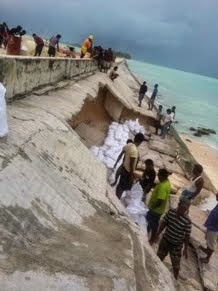Climate Change is Ripping Apart My Adopted Family and Country Tarawa, Kiribati (formerly known as the Gilbert Islands)
On December 12, 2000, I wrote home from the middle of the Pacific Ocean.
It’s so pretty here, but scary too. I heard about global warming and I just wonder if it is true. Being here sure makes it seem real. But I guess I trust the US Government. They wouldn’t send us here if they thought it was a real threat. I asked one of my Kiribati teachers about global warming and he assured me that it was nothing serious. He said, people have been saying that Kiribati would go under the ocean since the 1980s and look… we are still here. So Mike, you should not worry.
It’s been almost fifteen years since I had that conversation on the narrow stretch of road which barely hovered above the ocean’s surface. Today the Nation of Kiribati is quickly losing its battle against the rising ocean. Kiribati (Kee-ree-bas) is one of five low lying atoll nations (Tokelau, Tuvalu, Marshall Islands, and The Maldives) in our world today. Their combined population of over 500,000 people today is facing the devastating consequences of climate change.
The rapid melting of the polar ice caps have produced exponential sea level rise and king tide surges. The February 19th king tide rose 2.94 meters above normal sea level, inundating much of the country’s livable land. The highest elevation point in the capital island is only 3.0 meters above sea level.

The January 19th King Tide brought an abandoned ship onto land. The ship’s name, Tekeraoi, means good luck. Photo Credit: Raimon Kataotao
This month, members of my Peace Corps host family lost their land and a house. Over 12,000 cases of Chikungunya and Dengue Fever, diseases transmitted by mosquitoes, were reported soon after the king tide.

Mike Roman and his Kiribati family
Continued contamination of fresh water sources have sickened local populations, destroyed terrestrial vegetation, and have killed animals living in Kiribati. Last week, residents worked tirelessly to rebuild sea walls, repair homes, and fix roads destroyed by the King tide.
One week later, Cyclone Pam’s impact delivered another devastating blow to the nation’s capital island.
Iorita Toroman of Tarawa writes,
"Yesterday and last night (March 9, 2015), south Tarawa experienced strong winds with rough seas and high tides causing further destruction. Most of the seawalls which were recently constructed have been destroyed. Roads are covered with sand, gravel and big stones from the ocean again. Residential houses along the coastal area are greatly affected by the strong waves too. Our lives are very threatened by sea level rise and we are worried about our future. Our wells which are our only source of fresh water have become salinized and are rendered unsuitable for drinking now. Our main food plants such as breadfruit, and pawpaw are dying because of the ocean. Most vehicle owners don't want to drive through the ocean’s remains, leaving many businesses and offices closed indefinitely. Confounding the problem, many workers do not want to go to work today as they stay home to rebuild seawalls from the rubble before the next king tide in a few days’ time."

Eight days after the ocean receded, the trees began dying, March 2, 2015. Photo Credit: Joan Temai Leupena
Inundation is now more frequent, and the impacts are more severe in this low-lying atoll nation.

Rebuilding the causeway after the effects of Cyclone Pam March 11, 2015. Photo Credit: Bibatur Rahman Ibrahim
Vasiti Tebamare of Kiribati writes,
"To be honest, I thought this is the end of my world. It’s like watching a live movie. People running for their lives, BUT praise the Lord it’s just a mini tsunami. Heaps of things destroyed, fortunately no one is harmed."
Now, people are beginning to wonder how long they will be able to remain in their homeland.
Learn more: http://whentherewasnomoney.blogspot.com/
All photos courtesy and copyright Mike Roman, except where noted
